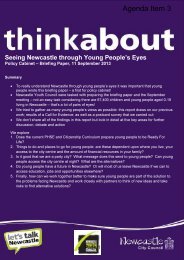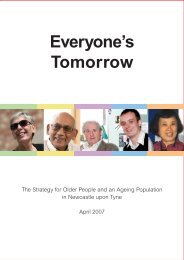NEWCASTLE'S MUSICAL HERITAGE AN INTRODUCTION By ...
NEWCASTLE'S MUSICAL HERITAGE AN INTRODUCTION By ...
NEWCASTLE'S MUSICAL HERITAGE AN INTRODUCTION By ...
Create successful ePaper yourself
Turn your PDF publications into a flip-book with our unique Google optimized e-Paper software.
CHAPTER SEVEN<br />
DR WILLIAM REA<br />
I had not heard of William Rea before I began researching Newcastle’s musical<br />
history and, I am sad to say, nor had anyone else I spoke to in Newcastle. All my<br />
inquiries met with a complete blank, it were as though he had never existed. Yet<br />
it would be no exaggeration to say that after Avison he did more to promote a<br />
higher musical culture in Newcastle than anyone else did. As I thumbed my way<br />
through collections of old programmes his name kept reappearing. It seemed at<br />
various times he fulfilled the role of council and church organist, pianist,<br />
conductor, choir master, arranger, organizer, lecturer and many other things<br />
besides. The man’s energy astounded me and very soon I found Dr Rea<br />
demanding my full attention. Unlike Avison, Rea was not a native Tynesider and<br />
I very soon found myself puzzling again over what made this man with such<br />
musical potential decide to bury himself in an organist’s post in England’s most<br />
northerly outpost I don’t profess to know the answer even now and may never<br />
know but I can say that the town’s musical history would have been the poorer<br />
without him. In the same way as Charles Avison had done he did much to<br />
promote Newcastle as one of the leading provincial music centres in the country<br />
and much more than Avison he worked hard at bringing music of a high standard<br />
to the ordinary people of the town.<br />
William Rea was born in London on 25 th March 1827. From being young he<br />
showed a remarkable aptitude for music and at an early age was placed under<br />
Mr Joseph Pitman, an eminent musician, who invented the pedal organ and<br />
introduced Bach’s fugues into England. Rea made such rapid progress that<br />
before he was in his teens he was acting as deputy to his master, who held the<br />
appointment of organist at Spitalfields. In his eagerness to study harmony under<br />
Schnyder von Wartensee, Rea took himself to the Continent. At sixteen years of<br />
age he was studying piano, composition and instrumentation under Sterndale<br />
Bennett (1816-75) and by 1843 had secured an appointment as organist at Christ<br />
Church, Watney Street. Two year later he appeared as soloist in a piano<br />
concerto at a concert sponsored by the Society for British Musicians, formed in<br />
1834 with the objective of advancing native talent in composition and<br />
performance. Shortly after, he was appointed organist at St Andrews Undershaft<br />
but soon vacated the post to go abroad again. In 1849 he went to Leipzig, where<br />
he studied under Ignaz Moscheles (1794-1870), a brilliant pianist and head of the<br />
Piano Department at the Conservatory, and also under Ernst Friedrich Eduard<br />
41

















